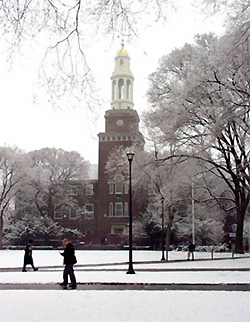 With nearly a quarter of a million students of diverse backgrounds, the City University of New York is one of the larger -- and certainly one of the broadest-based -- of the city's institutions. It carries with its educational mission the affection of its many alumni, some of whom have attained great prestige.
With nearly a quarter of a million students of diverse backgrounds, the City University of New York is one of the larger -- and certainly one of the broadest-based -- of the city's institutions. It carries with its educational mission the affection of its many alumni, some of whom have attained great prestige.
But, while there has been much public attention on the (apparently completed) negotiations between the Bloomberg administration and the United Federation of Teachers, a union that represents 60,000 teachers of public elementary, middle and high schools in the city, there has been much less about the stalled negotiations between the administration and the Professional Staff Congress, the 20,000-member union that represents the faculty and staff of the City University of New York.
As the New York Times reported last week, buried in a larger story about the mayor’s insistence on “productivity increases” in exchange for salary raises: “Some unions are angry because they remain without contracts. Most notable are the Uniformed Firefighters Association and the Professional Staff Congress, representing City University teachers.”
The negotiations have been stalled largely over economic issues, as the union has been offered a salary increase of only 6.5 percent over three years, a figure below the rise in the cost of living. The union and the university are discussing salary scales and other such details, but they are also, in a real sense, working out a larger struggle about the values and funding of public universities.
The social and political struggles in higher education take many forms, but they might be summarized as the battle over the move towards a corporate model. A corporate model calls for “productivity increases,” and for “accountability” to be measured by the administration’s assuming greater centralized decision-making power that once was considered a faculty prerogative. The university’s trustees, for example, (negotiating on behalf of the mayor and the governor) have demanded that any new contract strip department chairs of their union membership.
The impasse is just the latest example of a lack of commitment to higher education by City Hall (and New York State) that goes back three decades, a shortsighted under-funding that could cause lasting damage to the city.
A History of Poor Funding
Severe de-funding added immeasurably to the problems at CUNY, with both Governors George Pataki and Mario Cuomo slashing the university’s budget year in and year out. These budget cuts could not have come at a worse time, with various politicians and commentators engaged in a campaign to reshape the image of CUNY by denigrating it, even while supporters produced figures and anecdotes to show how it plays a crucial role in the culture and polity of New York City.
The conflict reached its nadir in 1999 when then Mayor Rudolph Guilani suggested that it should be burnt down. Others, like the would-be mayor Herman Badillo decried its low standards. Benno Schmidt, now the Chair of CUNY’s Board of Trustees, and at the time the CEO of a charter school company, referred to CUNY as an "institution adrift." (See Educating All New Yorkers At CUNY.)
The university struggled along, occasionally invoking its storied past (the Nobel Laureates from City College, for example), while trying to acknowledge in some useful ways the changed student body (many immigrants and public school graduates with less than sterling academic preparation.) Hovering over the struggle was the persistent image of "open enrollment" -- a noble social experiment that guaranteed admission to CUNY for all the city’s high school graduates - that imploded in the wake of the deep budget cuts and dragged the university's reputation down with it.
Despite verbal assurances that the university would be turned around, no fundamental budgetary improvement or long term commitment materialized. Increasingly the job description for a CUNY president included skill at fund-raising. This was a result of the logic of many in city and state government, who feel that private philanthropy should replace public funding. Thus, “privatization” has joined the agenda of those who would remodel CUNY.
But who would readily contribute to an "institution adrift", especially when it was a decades-long tradition that private philanthropy went to private colleges, and public institutions were funded by tax levy revenues? This two-part invention was in some ways directly responsible for the high standing of education in America. Ruling elites used private college successfully to recreate the managerial class that insured their wealth, while public universities generated openings in the professions and other fields that would be available to the poor and middle class families.
Publicly funded higher education, however, received less and less public support throughout the nation in the 1980's and 1990's. Public universities nationwide used to have 74 percent of their budgets funded through taxes; this has fallen in the last fourteen years to 64 percent. The difference must be made up by tuition hikes and private donations. (See "At Public Universities, Warnings of Privatization" and “The Money Crunch in Higher Education”)
The public has apparently been slow to awaken to this state of affairs. When CUNY's chief negotiator could introduce a pay offer several points below inflation and describe it with a straight face as "reasonable," it is clear that what was once a full-hearted civic commitment to the education of all the city’s citizens appears more and more to be changing to a quite different vision.
Charles Molesworth, who has taught for 36 years in the English Department at Queens College, serves as a union official in the Queens College chapter of the Professional Staff Congress.
Â




